The Baily Family of Chester County, Pennsylvannia –
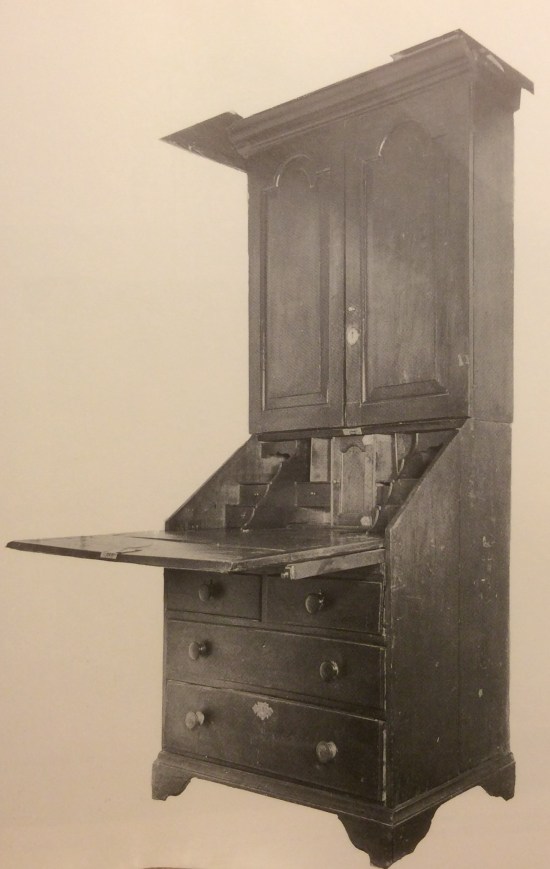
Joel Baily of Bromham, Wiltshire, England arrived in Chester County around 1682. Nine of his descendants are listed in “Furniture and Its Makers of Chester County, Pennsylvannia” by Margaret Berwind Schiffer which spans the years 1682-1850. The Bailys are noted as cabinetmakers, joiners, turners and watchmakers. The lives of two Bailys, Joel from the 3rd American generation and Yarnall from the 5th generation, have the most detail for review.
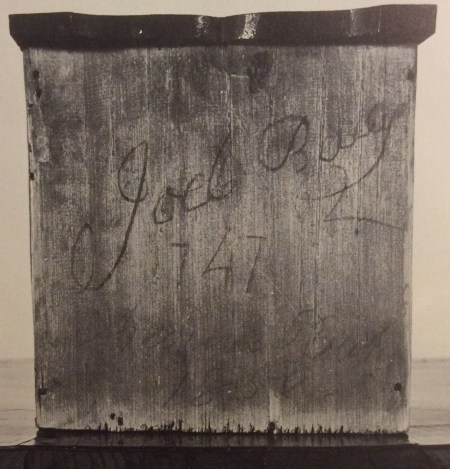
Joel Baily (1732-1797), of the 3rd American generation, was a cabinet maker in West Bradford township. His son, Emmor, was a watchmaker and eventually moved to Baltimore. When Joel died he left an estate valued at $3463.91, including his tools:
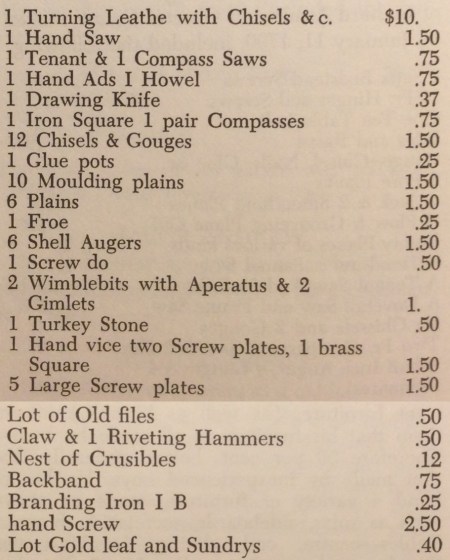
Yarnall Baily (1799-1862) was born in West Chester and his first known listing as a cabinetmaker or joiner was in 1824. His father was not a woodworker and we don’t know where he learned his trade.
There is a fairly continuous record of Yarnall’s advertisements from 1829 to 1848. In his 1829 ad he, “…WANTED immediately, One or two Journeymen, that will recommend themselves by their work, to whom liberal wages will be given…”
By 1834 Yarnall had moved to the southwest corner of Market and New Streets in West Chester. He emphasized his “…practical experience in the business…to the selecting of mahogany and other lumber, hardware, &c…he employs none but good workman. He has a Variety of ready made Furniture on hand and is ready to execute to order any article in his line with dispatch…Carving done for cabinetmakers heretofore.”
In the next couple of years Yarnall advertisements put more emphasis on ready-made furniture and continues to offer carving work and turning. A 1837 ad is for coffins:
TO THE PUBLIC, THE Subscriber being induced by his friends, and his own experience, has and intends keeping on hand, of all sizes, Coffins, so that he will be enabled to meet the wishes of those who may have the painful necessity of wanting an article of the kind…
In the following year his ad states “…his furniture is all made by men–Therefore 50 percent better, generally than that made by inexperienced boys…” All types of desks, tables, stands, bedsteads and other household furniture are available and at short notice he can make to order anything in his line as he has a number of men in his employ. Additionally, ” He keeps COFFINS of all sizes on hand, (better than when made in haste,) so that he can accommodate those who may want as they desire.”
Yarnall started his trade at a time when joiners or cabinetmakers were making custom pieces but finding the need to increase their production of ready-made pieces. Through time his ads still offer custom work but more and more emphasis is put on his ready-made stock and his ability to meet the needs of customers “from cradle to grave.” From 1839 through 1841 he advertised for experienced workers (journeymen and cabinetmakers) and apprentices.
In July 1845 Yarnall Baily sued Charles La Place for libel. From the court documents:
“…[La Place] falsely, maliciously, unlawfully, wickedly, willfully and designedly, did write and publish, and cause to be written and published a certain false, scandalous, infamous malicious and defamatory libel of and concerning the said Yarnall Baily, in the form of an address or caution to the public, which said false, scandalous, infamous, malicious and defamatory libel in according to the tenor following to wit: “Caution to the Public”
“There is a man in your Borough that is in the habit of making poplar coffins and palming them off on poor individuals for wallnut, his name is Mr. B. …he sold a poor man a a coffin for his wife and charged him nine dollars for it wich is three times as much as the county allows the undertakers–it is true the poplar coffin was a very good imitation of wallnut, but it is honest would a man of any principle be guilty of such small business–A man that will cheat a dead woman would rob a church Steeple–Let him go on with his Rascality his conscience if he has any will be his own punishment. ”
We don’t know how or if the “Caution to the Public” incident hurt Baily’s business. Three years later in 1848 Baily advertised the close of his business in West Chester.
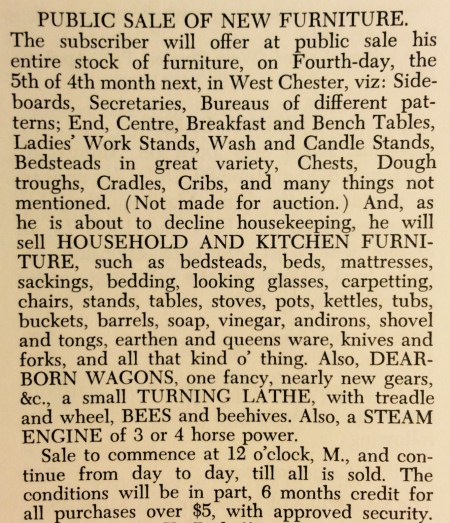
Yarnall Baily moved to Philadelphia but the only records of him in the business directories are in 1858 and 1860. In 1858 he was listed as a Gentleman; in 1860 his listing was “patent lamps.” Between 1848 and 1858 he may have continued to work in a relative’s shop or business. It wasn’t uncommon for an older craftsman to work in a son’s or relative’s shop, however, we do know Yarnall’s only son did not become a cabinetmaker.
He may have worked for one of the Cope businesses as his daughter had married into that family. The patent lamps listed with him in the 1860 directory may have been one of the early incandescent lights that had been developed by English and Scottish inventors. The Cope family ran a Philadelphia to Liverpool packet line and this could have been a supply source for the lamps. What we do know is exactly when and how Yarnall died.
In 1862 Yarnall was the superintendent of varnishers in a munitions plant owned by Samuel Jackson. It was about a year into the Civil War and at 63 Yarnall was helping with the Union war effort. Early on the morning of March 29 there was a devasting explosion at the plant. It took several days to find all of Yarnall and all other employees killed by the blast. Below is an article from a Philadelphia newspaper and an artist’s rendition of the blast. Poor Yarnall.
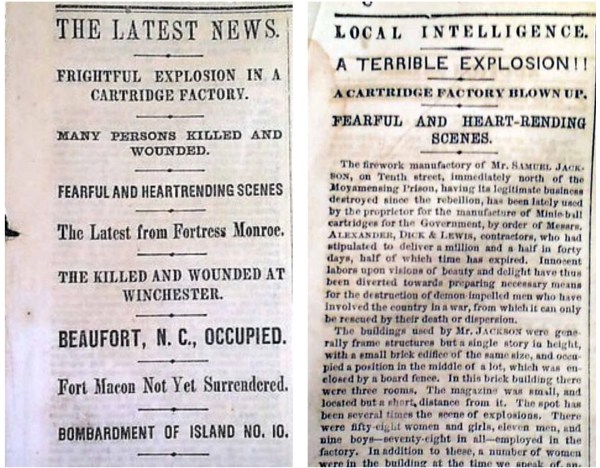
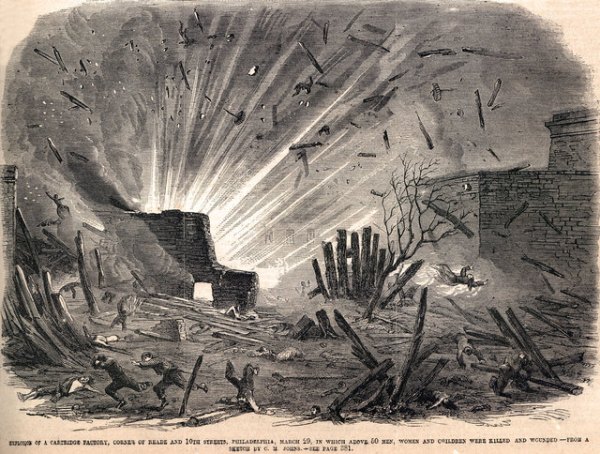
–Suzanne Ellison






